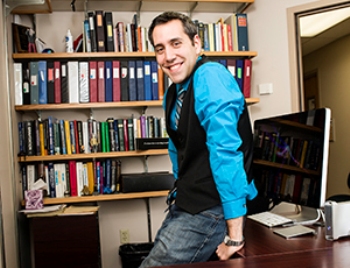May 23 2013
A Montana State University physicist who recently led Bozeman in celebrating Einstein has now won a five-year $500,000 Young Investigator CAREER Award from the National Science Foundation.
 Nico Yunes, an assistant professor of physics at Montana State University, has won a prestigious Young Investigator CAREER Award from the National Science Foundation. (MSU photo by Kelly Gorham).
Nico Yunes, an assistant professor of physics at Montana State University, has won a prestigious Young Investigator CAREER Award from the National Science Foundation. (MSU photo by Kelly Gorham).
Nico Yunes, 32, learned about his award the same day he was notified that he and Angela Des Jardins, director of the Montana Space Grant Consortium (MSGC), were named Fellows in Engagement in MSU’s College of Letters and Science. The designation recognizes their significant contributions in communicating science to the public. The CAREER Award is the NSF’s most prestigious award that supports the early career development of teacher-scholars and honors outstanding scientists who haven’t yet received tenure.
“That was a great day, a very good day,” Yunes said.
Richard Smith, professor and head of the MSU Department of Physics, said, “When one of our faculty wins a CAREER award, we are very pleased because it reflects well on the very high level of research programs at MSU, the top notch caliber of the faculty we are able to attract, and the respect that peer scientists around the country have for the talent and potential they see in new faculty at MSU.
“Nico's proposed work, along with that of the gravity group at MSU (with Neil Cornish and Ron Hellings) is helping the community of gravitational wave astronomers to put in place a theoretical framework to help them identify gravity waves, the ripples in the fabric of Einstein's space-time, when they are (hopefully) first detected later in this decade,” Smith said.
Yunes, a former Einstein Fellow at the Massachusetts Institute of Technology (MIT) and research associate at Princeton University, said he will use part of his CAREER grant to continue researching Einstein’s Theory of General Relativity and gravitation. To help in that effort, he will hire an additional graduate student and postdoctoral researcher for his research. He will also use his grant for outreach and education efforts to take the Einstein celebration, held locally in April, to the next level.
MSU held “Celebrating Einstein” two years before the 2015 centennial of Einstein’s Theory of General Relativity and the impending detection of its final prediction, gravitational waves, to build public awareness and excitement, Yunes said. He added that his CAREER grant will allow him to take the Einstein celebration beyond Bozeman and onto a national stage.
He wants, first of all, to make Einstein materials available to other universities that plan to hold their own celebrations. Princeton, MIT, Dartmouth College and the University of Wisconsin-Madison are among those that have already expressed interest, Yunes said.
He also wants to have “Celebrating Einstein” materials translated into Spanish so schools, especially those across the southern tier of the United States, can hold Einstein celebrations, too. Joey Shapiro Key, for one, said she could use such materials in her new position as director of education and outreach at the University of Texas at Brownsville. Key is currently the education specialist at the MSGC and one of the co-organizers for “Celebrating Einstein.”
In addition, Yunes said he will use his grant to work with MSU’s Museum of the Rockies and develop a 20- to 30-minute planetarium show that incorporates the “Celebrating Einstein” materials from MSU. The show will be available for free to 1,000 small planetariums across the United States.
He will also use his grant locally to continue the Science Bowl that began with “Celebrating Einstein” and builds community among MSU physicists, Yunes said. Similar to the television game show, “Jeopardy,” the bowl involves four-person teams that include one undergraduate, two graduate students and one postdoctoral researcher in physics. They compete by answering general physics questions such as “How old is the universe?” (13.8 billion years old) and “How long does it take for light from the sun to reach us?” (about eight minutes). They also answer questions that require simple computations.
Regarding his research, Yunes said he will use his CAREER grant to help him calculate gravitational wave solutions that could then be used as software filter. These filters are critical to detect gravitational waves and to test Einstein’s theory.
The idea is similar to someone looking for a rock in a haystack or a miner panning for gold, he said. First, the seeker has to know what the rock or gold look like. Is the gold in the form of a brick or sphere, for example? How big is the rock? Knowing that allows physicists to design a filter that captures the rock or gold (the gravitational wave) while letting the hay, water or mud (the noise) flow through the filter.
Gravitational waves are produced by violent astrophysical events, such as when stars explode or two black holes collide, Yunes said. Physicists believe they may be able to detect them for the first time in the history of humankind by the end of this decade. They say this feat will test the accuracy of Einstein’s final theory and lead to revolutionary discoveries about regions of the universe that are currently inaccessible with traditional electromagnetic astronomy.
“To make a simple analogy, these waves are like the soundtrack to the universe, and their detection will be like transitioning from mute pictures to modern cinema,” Yunes said.